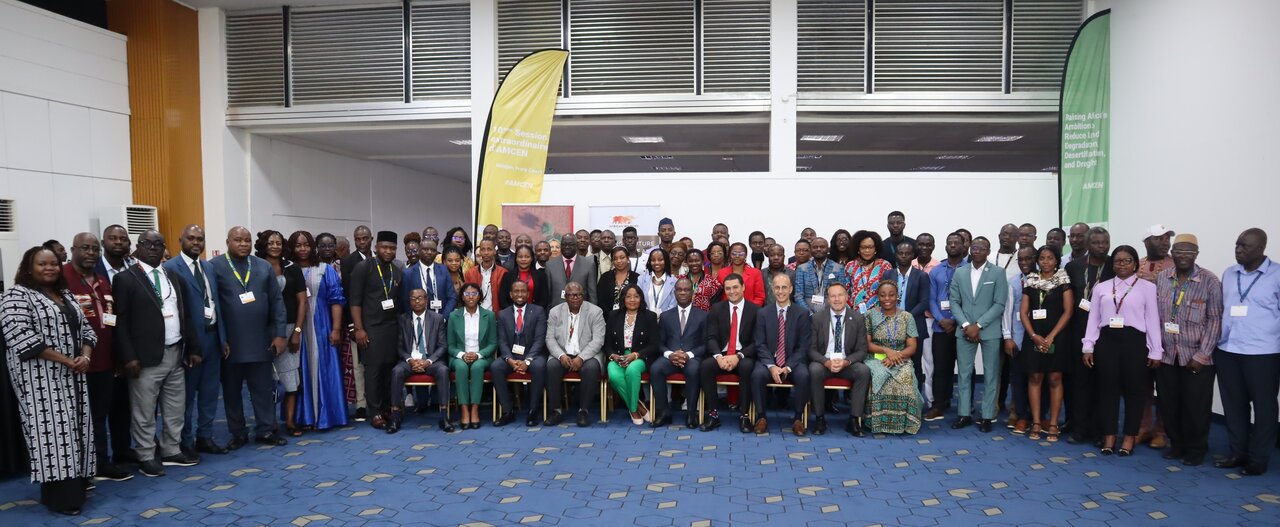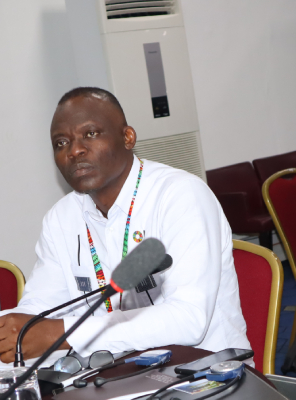AMCEN Shapes Africa's Agenda, Calls for Action on Drought and Land Degradation at COP16

UNEP Major Groups and Stakeholders at AMCEN
Southern Africa is facing one of the worst droughts in a century, with some areas receiving less than 25% of their usual rainfall, a direct consequence of the ongoing climate crisis. Intensifying El Niño patterns and extreme heat are driving this historic drought, devastating communities, damaging economies, and threatening ecosystems. This crisis highlights the urgent need for coordinated global action to tackle the interconnected challenges of climate change.
Earlier this month, the 10th Special Session of the African Ministerial Conference on the Environment (AMCEN) convened in Abidjan, Côte d'Ivoire, to discuss Africa's priorities ahead of key climate summits, including the upcoming UN Convention to Combat Desertification (UNCCD) COP16. Under the theme “Raising Africa’s Ambition to Reduce Land Degradation, Desertification, and Drought,” AMCEN brought together ministers of environment, and non-state actors to tackle pressing environmental issues. Among the declarations agreed at the end of the session was a call for a legally binding protocol on drought resilience within the UNCCD, emphasizing the need for stronger partnerships and increased investment in sustainable land management to build resilience.
The African Wildlife Foundation (AWF) actively engages in AMCEN processes by participating in and supporting the Africa Regional Consultative Meeting (RCM) of UNEP Major Groups and Stakeholders (MGS), which addresses pressing environmental challenges. The UNEP Major Groups and Stakeholders (MGS) is a framework established by the United Nations Environment Programme (UNEP) to engage civil society and non-state actors in environmental governance and decision-making processes. AWF also served as an observer during the Technical and Ministerial segments of AMCEN.
In partnership with UNEP, AWF also supports young professionals through the AWF Charles R. Wall Young African Policy Fellows Program, providing opportunities to attend AMCEN and other conferences. This year, three fellows from Zimbabwe, Cameroon, and Equatorial Guinea participated as observers, gaining invaluable exposure to AMCEN processes, decision-making, and Africa's coordinated approach, equipping them with essential skills for future negotiations.

Charles Balogoun Oyeoussi, UNCCD Civil Society Organizations Panel Chair and Africa Representative.
As Africa prepares to take the global stage, we spoke with Charles Balogoun Oyeoussi, UNCCD Civil Society Organizations Panel Chair and Africa Representative. He highlighted Africa's critical role in shaping COP16 outcomes and the importance of civil society in driving people-centered solutions to environmental challenges.
Q. With the UNCCD COP16 set to be held in December, what are the key priorities and expected outcomes specifically for Africa?
A. UNCCD COP16 will be a crucial event for accelerating global action on land restoration and drought resilience. Taking place in Riyadh, Saudi Arabia, this landmark conference will coincide with the 30th anniversary of the Convention, highlighting the need for urgent, coordinated action to address the interconnected challenges of land degradation, climate change, and biodiversity loss.
As one of the three major Rio Conventions—alongside the climate and biodiversity treaties—the UNCCD emphasizes that we cannot tackle the climate crisis, biodiversity loss, and land degradation in isolation. Healthy land is at the heart of achieving global climate, nature, and sustainable development goals, and COP16 aims to bring this focus to the forefront. The expected outcomes of COP16 include raising global ambition and adopting a people-centered approach to land and drought resilience. It will be the first major UN conference hosted by Saudi Arabia, marking a significant moment for the country and the region in their green transition efforts.
Q. In your view, what role should non-state actors play in tackling desertification, land degradation, and drought ahead of COP16 and beyond?
A. Non-state actors, including civil society organizations, are crucial for carrying out the Convention's strategic framework. That's why the UNCCD Civil Society Organizations Panel was established, made up of representatives from five regions – Africa, Asia, Latin America, and the Caribbean, Central and Eastern Europe, and the Northern Mediterranean. The Civil Society Organizations Panel ensures that voices from diverse regional contexts are included in discussions related to desertification, land degradation, and drought. At COP16, civil society organizations have observer status, allowing them to share their perspectives on agenda topics without directly participating in negotiations. The Panel actively contributes by presenting official declarations to the plenary sessions and providing input on documents prepared by the secretariat. These contributions help shape the final decisions of the conference.
Q: What strategies and partnerships are most effective in achieving the ambitious goal of restoring 1.5 billion hectares of degraded land by 2030?
A: The goal of restoring 1.5 billion hectares of degraded land by 2030, set during UNCCD COP15 in 2022 in Abidjan, is highly ambitious, particularly given that land degradation currently affects 3.2 billion people and up to 40% of the world’s land area. Africa is especially impacted, with 65% of its land degraded over the past 70 years, leading to increased risks of famine and food insecurity. Achieving this goal will require strategic partnerships and effective approaches.
Key strategies include expanding sustainable land management practices, integrating local knowledge with innovative technologies, and boosting financial and technical support for restoration projects. Building strong partnerships among governments, international organizations, civil society, local communities, and the private sector is essential for mobilizing resources and ensuring successful restoration efforts.
The UNCCD underscores the importance of aligning these efforts with Sustainable Development Goal 15, which focuses on life on land and is closely connected to human survival and combating climate change. The mid-term review of the 2018-2030 Strategic Framework stresses the need for reliable and impactful partnerships to turn this vision into reality for the benefit of all.
Q. How is UNCCD addressing gender inequality and ensuring secure land rights for women and marginalized communities?
A: Gender inequality and secure land rights for women and marginalized groups are major concerns for the UNCCD. At COP14 in India, gender-related issues were a key focus, resulting in decisions to address land tenure systems and conflicts that often create significant barriers, especially for women and vulnerable populations.
Despite these efforts, discrimination in land access persists, particularly affecting women, girls, and people with disabilities. Organizations such as the Youth Initiative for Land in Africa (YILAA) and the Global Convergence of Struggles for Land and Water in West Africa (CGLTE-AO) are actively advocating for gender equality in land rights. Their work is essential in breaking down barriers and ensuring that land restoration initiatives are inclusive and empower all members of society, especially those most impacted by land degradation and climate change.
Q. What strategies are in place to involve young people in the decision-making processes?
A: The Secretariat has established the Youth Caucus to coordinate concrete actions involving young people in implementing the Convention's objectives. The UNCCD Land Heroes campaign recognizes and supports young individuals and youth organizations making significant contributions to the fight against desertification, land degradation, and drought. In 2024, ten new Youth Ambassadors were selected to highlight key milestones in the Convention’s history, share insights on the upcoming negotiations at UNCCD COP16, and present their policy recommendations in preparation for the conference.